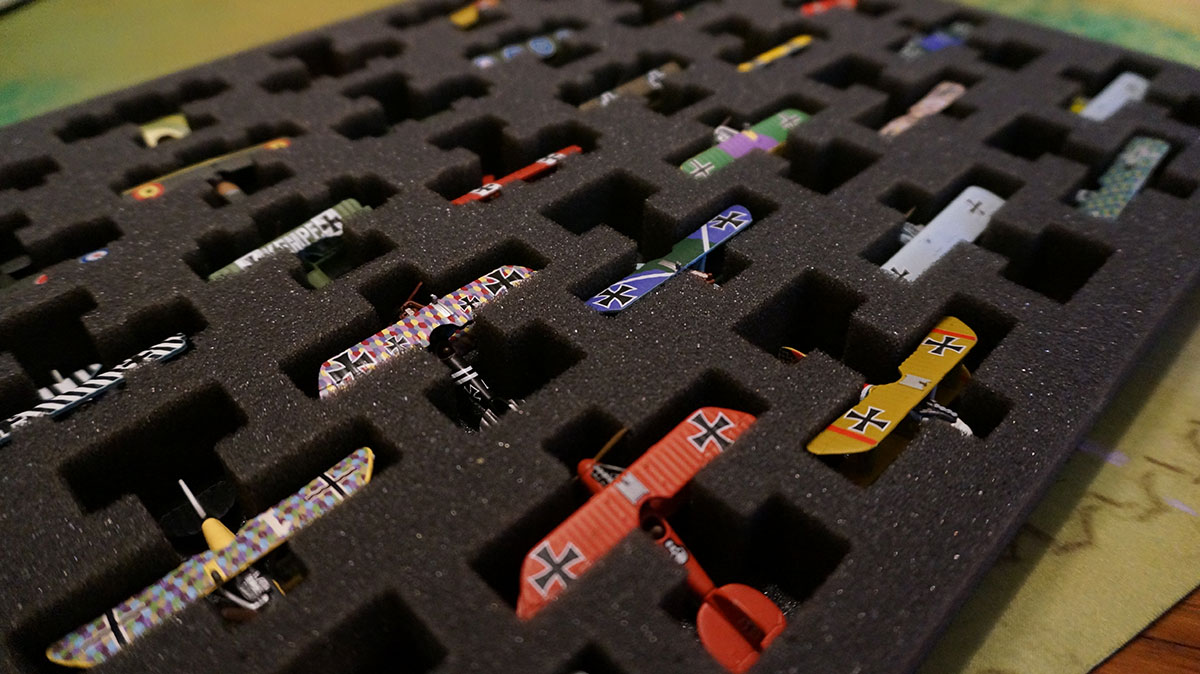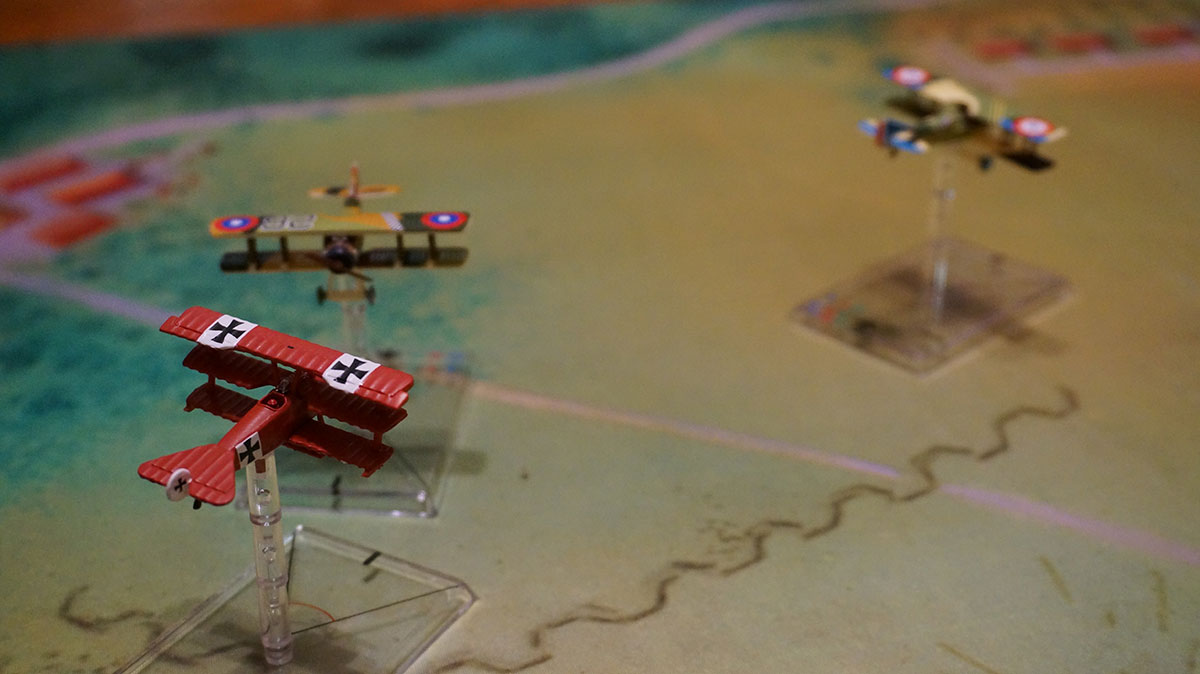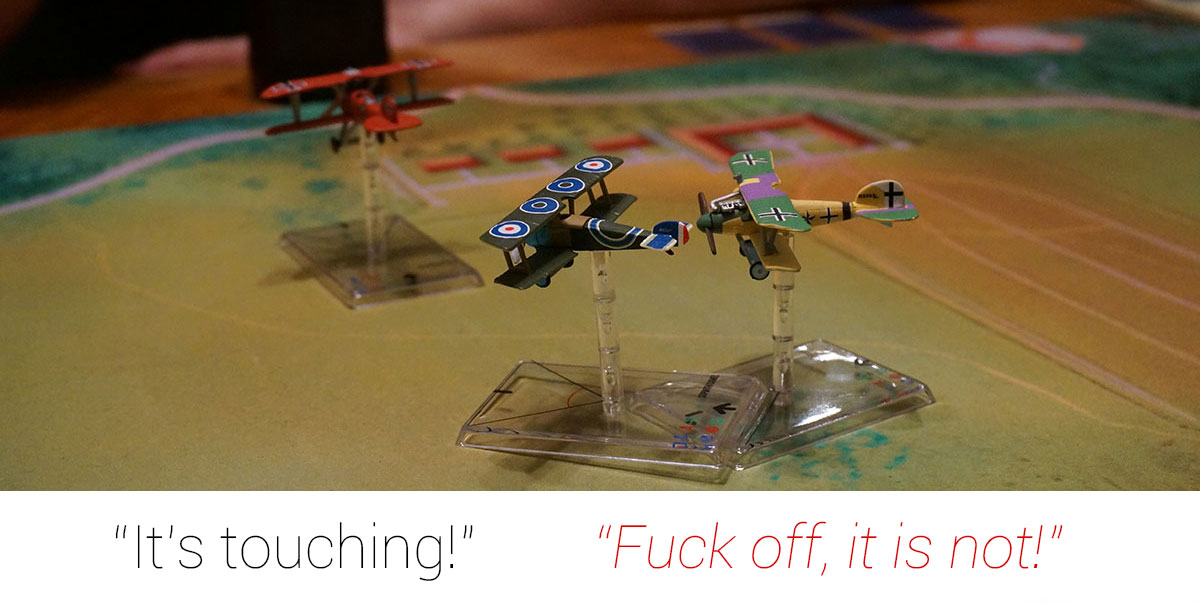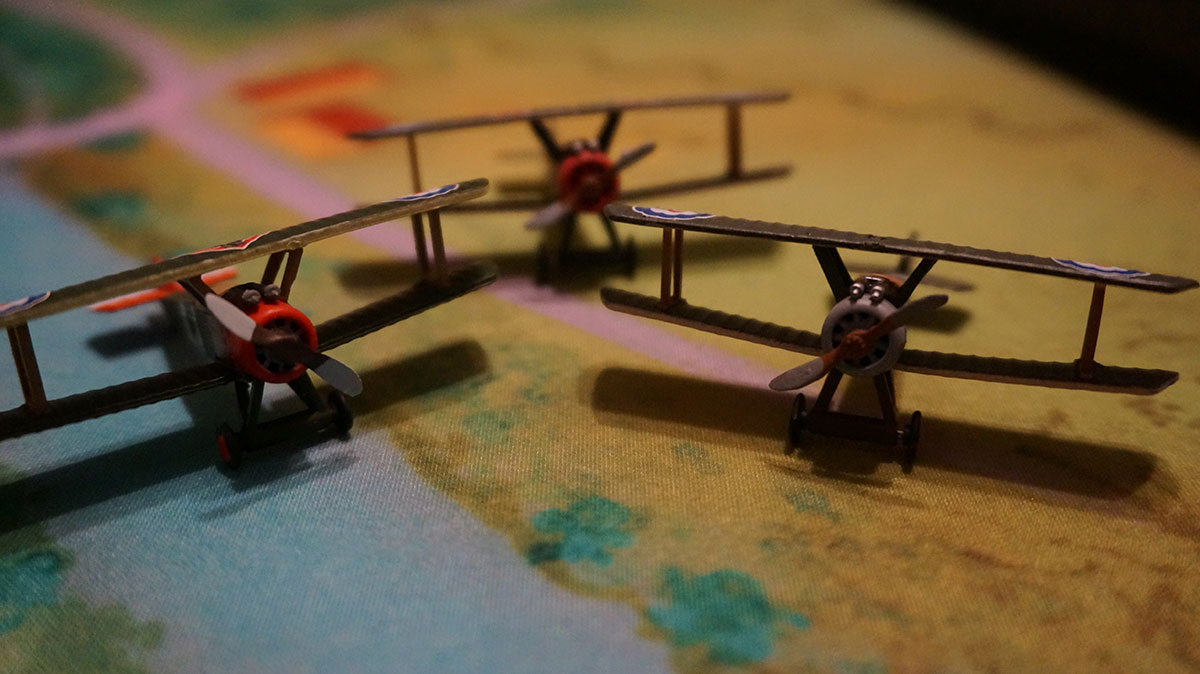Outside of work hours (or work assignments), I’m finding myself playing as many board games as I am video games these days. I’d long assumed the reasons for this was the obvious: that sitting around a table, beer in hand, was an infinitely more social experience than sitting on my couch shouting at strangers (if I was talking to anyone at all).
But on Saturday night, I think I came to a realisation. I wasn’t playing board games for the social interaction. I mean, I was, but that wasn’t the main reason I was moving little pieces around a table instead of sitting in a room playing FIFA or Madden or Mario Kart, all video games that could be just as social as anything played hunched over some cards and pieces.

The reason was physical.
I spent Saturday night playing Wings of War. It’s a fantastic game, originally designed as a card game but later adapted into something you play on a table using wonderful little plastic models of fighters. Part of the physical appeal of this is, yes, the fighters themselves. They’re very collectible, and one of my buddies does just that, buying plane after plane not just for use when we play the game, but just so he can add them to his menagerie.
It’s a pleasure pushing them around a table, lining them up for shots, making little “pew pew pew” noises as they get into combat. Just like an avatar in a video game helps with immersion and identification, so too does having your fighter in this game represented by a detailed model instead of something more abstract.

The main appeal of this physicality, though, was the mess it made of things. Wings of War is a game that takes place with no grids, or dice, or anything else that guarantees accuracy and conformity. You move your planes around on an open battlefield, and wherever they’re pointing at the end of a turn is where your shots will be fired.
This means that the slightest bump — whether intentional or not — can change the game. A shot that had been out of range is suddenly dealing damage, all because you bumped a fighter when reaching for a beer. A movement that looked to one set of eyes to have been illegal is, to another, totally fine.
This might sound horrific to you if you crave the absolute arbitration that video games can offer. In a video game, there is no grey area. No bumps. Every angle, movement and decision is calculated down to the smallest detail, and there are no grounds for mediation. You take the computer’s ruling and you either like it or quit.
I love the conflict, though, that can arise between the player and the rules. That battle of wills, where the spirit of the law goes up against the letter (and the other players). Contested moves and decisions become more than just a move, they become legal debates over laws and their purpose, and a contest between players as much as it is between players and the rulebook.
It adds so much more drama to a game. It also adds depth and interest to it; I remember some of the better moves and shots from my game on Saturday night, sure, but the things I remember most were the hotly-contested decisions and accusations of tampering, of missed card draws and fudged damage counting. Elements of the game that had a human side to them, that told a story, that weren’t just cold calculations.

Imagine if, instead of simply suffering through lag in a multiplayer shooter, lag was something that could be argued? Or a lost battle in Civilisation replayed because you had a suspicion the computer’s dice fell off the table and had to be re-rolled?
I could say I wish there was more of this exciting inconsistency in video games, but no. That would be beside the point (and also weird; why would you specifically program something to be less specific?). Instead, it just serves as the latest reminder that for all the advancements made in networks, game design and visuals, there are some things video games may never do better than board games.
Cute little model planes being one, but arguments over human error/cheating being another.


Comments
20 responses to “Video Games Are Too Perfect, Which Is Why I’m Playing More Board Games”
Video games are too perfect? Did you even play the latest Assassin’s Creed?
If you think of games as a system of rules then the way thay video games handle things and give a consistent framework to play in is pretty perfect. Glitches and other screwiness aside.
One of the things that board games do differently is have the player(s) handle all of the rules and give more control as a result.
For some, that’s a plus. Personally, it isn’t part of what appeals to me.
That game was as monotonous as Monopoly.
I only got it because it came with the Xbone. I tried parting ways with it before I even got it. Ended up putting it on there and wow. Regrets filled my heart. Such a garbage game.
Everyone at Ubisoft started inexplicably crying after this burn. They probably blamed it on the air con, though.
So basically because you have the ability to interact in a physical space with other players… Like reaching across and punching the other person in the face during an argument over a board game, for which there are rules you could just follow and the argument is over, it makes it somehow better?
That logic is interesting.
Side note, I’ve never personally come across a case where someone arguing to no end over a board game move WASN’T cheating and just trying to cover their bullshit.
If two people are arguing, one of them may not be cheating.
Plus, sometimes the rules are ambiguous. Fantasy Flight just downright sucks at writing rulebooks and that can lead to a lot of tears.
The best is when you are arguing about stuff that is discretionary in the game, such as whether the laws of physics should grant a difficulty modifier in D&D or Pathfinder. Oh, the hours that our D&D group has spent gleefully debating how a fantasy game should take real life physics into account 🙂 Of course, the DM ends up getting the shits, but it’s fun while it lasts.
Yeah, it’s possible but that never happens. I play boardgames with my friends where a bit of controversy is fine, and no-one’s punching anyone in the face. I play online games with these people as well, but there’s nothing like getting around a board-game where it feels so much shared and those moments stick with me.
There might not be face-punching, but there’ll be back-stabbing. Oh so much back-stabbing.
Physicality is why stop-animation and puppetry and pinball are awesome.
Seems to me that, what the author is really trying to say is that video games are too restrictive and rigid. I mean, you can’t really retcon something in a video game or have house rules.
Taken to its logical extreme, text-based MUDs allowed (allow?) users to interact with each other without rules in an electronic environment, much the same as LARPing in real life. The only rules are ones that the parties make themselves.
I do like the flexibility of the rules. We were playing Mysterium on Saturday night (a game which might be my favourite). For those unfamiliar it’s essentially Dixit combined with Cluedo. The players are paranormal investigators investigating house haunted by the ghost of someone who was murdered. They’re initially tasked with generating possible scenarios (your Cluedo person, place and weapon) for what happened to the ghost before eventually deciding on which one really happened. To do this, the ghost hands out Dixit style surreal image cards that hint (to wildly varying extents) to a particular place, person or weapon.
In our game we got to working out the last weapon of the last scenario and long story short, burned through our entire time line while the ghost got more and more flustered. Rather than finish the game there we decided to push on through to the crime solving allowing for a single, sudden death guess which we got right.
We still lost the game, but bending the rules made for a far more satisfying ending.
Board games still require imagination, and can be different every time you play. Video games just begrudgingly allow you to press a few buttons between their unskippable pretty skybox movies.
Yes. This does sound horrific to me. You are crazy, Luke. CRAZY.
I can’t stand it when people don’t read the rules and make assumptions for what the rules should be.
I hate explaining the rules to people who don’t read them. It’s a real skill. There’s 20 pages of rules and you need to crunch it all down to something digestible and hope people don’t die from boredom and/or impatience. Yet, you know that most of the time, once you start playing, people will get it.
I have a feeling that this is just something that needs practice, like public speaking.
Also, I’ll be honest here. I am a hypocrite. Often, if someone else has agreed to bring the game for the group session, I haven’t read the rules as preparation.
There’s a reason why games are all about “perfection” and defined rules….its called online gaming.
While I get what the author is trying to say, their argument is somewhat flawed and ignores a lot of modern gaming trends. Sure, games have rule sets, and sure they are most often incontrovertible. However, once you discover the glitches, skips, hacks, exploits and optimal routes then you start to nudge the table, move the pieces when no one is looking and yell “Blitzkrieg” while throwing the board into the air. Alternately, if you don’t like the rules or want to spice things up a bit, make up your own ruleset in the form of a mod or try out someone else’s.
Even then, when you work within the bounds of the program, many competitive games still have the same degree of psychology, mind games and heckling that a tabletop game has. I’m sure everyone has screen cheated at least once, or run physical interference with your opponent to make them screw up. As much as people hate it, camping and kill stealing are the same sorts of thing as always putting down Skip cards in UNO or helping yourself to a loan because you’re the banker. In the end, video games can provide the same “physicality” as a real game, just in different, less physical ways.